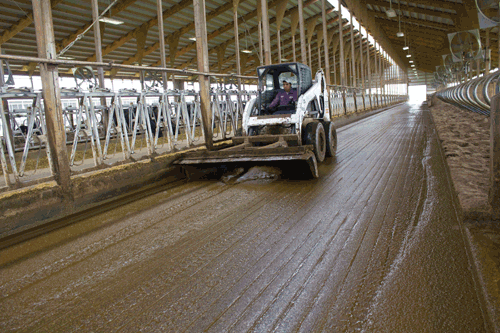
Safety is no accident. Good training, written protocols, and the right attitude keep people out of harm's way. And if you employee 500 man days of nonfamily labor in all quarters of the year, the United States Department of Labor's Occupational Safety and Health Administration officials (OSHA) might be making an unannounced visit to your dairy. Those 500 hours equal five to six nonfamily employees, and OSHA wants to make sure they are following approved safety procedures and have adequate training.
Operations with grain storage facilities have been on OSHA's watch list for years. And, due to a recent spike in grain bin entrapments, the most since 1978, grain bins are cause for greater concern. As of October, there have been 46 entrapments, and 25 have been fatal. And, just recently, a young man lost his life when the skid steer he was operating at a dairy went off a push-out ramp, and the entire machine ended up in the manure pit. Unable to escape, the young man sadly perished.
Unannounced farm visits
Since then, a number of farms in northwest Wisconsin have been receiving unannounced visits from OSHA as that federal agency develops standards to inspect safety standards at dairy operations. According to Wisconsin AgriService Association's Jeff Carter, "Safety training, hazard communications, equipment guarding, and electrical issues are OSHA's primary concerns."
"Training must be understood," notes Carter. "It must pass the effective' test. Does your employee get it? Have all language barriers been addressed?" Carter asks.
"During an OSHA visit, investigators will interview employees to ensure they understand safety procedures," he says. "OSHA will also ask you to prove that training took place. Document it. This includes compliance and best practices.
"Don't overlook new hires when it comes to training," cautions Carter. "Before new employees are exposed to any risk, they must be trained about potential hazards. Failing to do so will open your business to undue liability," the safety trainer went on to say.
All equipment must have guards in place. "If it is exposed, it's not guarded," states Carter. "Anything below seven feet must be guarded," he says. "A simple thumb rule is if you can get a finger into an area, guarding is not adequate."
Guards can also include ROPs (Rollover Protection System). "Every tractor should have one," recommends Carter. "By law, tractors built after 1975 must have them," he went on to say.
Under hazard communications, Carter suggests that all material-handling information for chemicals and pesticides be readily available for employees. "These are easy to find. In fact, they can be downloaded via the internet," notes Carter.
Electrical is the last of OSHA's primary concerns. All electrical wiring must be up to code. "Don't overlook extension cords. They are everywhere. If your farm has frayed extension cords, replace them. It's a citation. One grain mill was fined for 22 cases of frayed extension cords. At $2,500 a violation, it can quickly add up," notes Carter.
Down the road
As OSHA begins to take a closer look at dairy farms, there are a number of areas they will be evaluating. "If you have grain bins, and many dairies do, they will look at procedures for the confined space entry," says Carter. "Perhaps a bigger concern will be manure pit guarding. The State of Wisconsin requires guarding per your manure pit application. Many states may have similar rules," he notes.
Carter advises owners to work with a consultant who specializes in safety. "Outside specialists can often identify potential hazards that owners and employees overlook because they see them every day.
"Also, engage your employees and ask for help. In many cases they have good ideas, as well," says Carter. "If you do bring in a trainer, sit in on the training. "If you don't sit in on training, it is no good," he notes after years of handling on-site training programs.
If OSHA makes a visit
What if OSHA shows up at your farm? "By federal law, OSHA cannot give advance notice when conducting an inspection," states Carter. "That means you need to know your rights," he says.
Ask for credentials and badges when OSHA officials arrive at your business.
Determine if your operation has enough employees to be inspected.
Find out if this is a random inspection or due to an accident on your farm.
Keep in mind that you do not have to provide demonstrations of operating equipment.
Lastly, ask if they have a federal warrant to inspect your operation.
"Technically, OSHA cannot come onto your business unless they have a federal warrant," states Chuck Palmer with Michael Best & Friedrich LLP. "While you can demand a search warrant, my advice is not to make it your policy," he says. "Work with the inspectors and see if you can find a reasonable time period to conduct the inspection if the day they stop happens to be a hectic day."
Fines for OSHA violations can be small to very severe. "The minimum penalty is $250," says Palmer. "Each serious violation can result in a fine for up to $7,000 each. And if there is a willful violation, those can cost your operation $70,000 a piece."
This article appears in the March 25, 2011 issue of Hoard's Dairyman on page 203.








